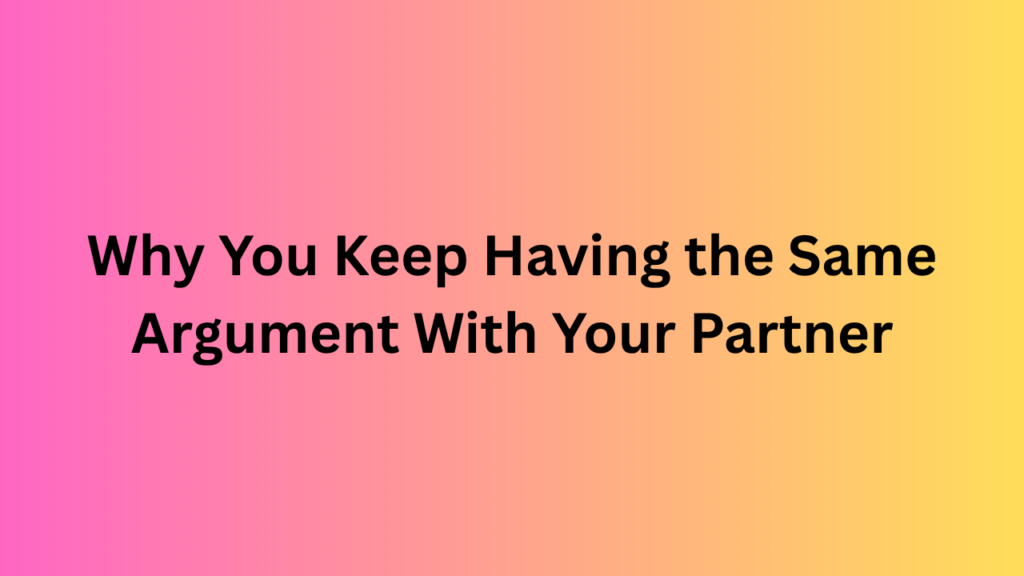Have you ever found yourself having the same argument with your partner over and over again? Whether it’s about chores, spending habits, in-laws, or how much time you spend together, it can feel like you’re stuck in a frustrating loop — like déjà vu with a touch of resentment.
If this sounds familiar, you’re not alone. Repeating arguments are one of the most common issues couples face. But they’re also a sign that something deeper is going on — and that it’s time to dig beneath the surface.
In this post, we’ll explore why these repetitive conflicts happen, what they’re really about, and how to break the cycle so your relationship can grow instead of stall.
1. You’re Arguing About the Symptom, Not the Root
Most recurring arguments are not actually about what they seem. On the surface, you might be bickering over the dishes — but underneath, it could be about feeling unappreciated or unheard.
Example:
Partner A: “You never help with the dishes!”
Partner B: “I do other things around the house. You just don’t notice.”
What seems like a complaint about dishes is often a plea for recognition or balance.
Solution: Next time the argument starts, pause and ask yourself: What am I really trying to communicate? Is it about fairness, respect, attention, or something deeper?
2. You’re Caught in a Pattern of Reaction, Not Communication
In many long-term relationships, partners fall into automatic roles: one pushes, the other pulls away. One gets louder, the other shuts down. This reactive cycle feeds itself.
Why it happens: When emotions run high, your brain shifts into “fight or flight” mode. You’re no longer trying to solve the problem — you’re trying to win or protect yourself.
Solution: Learn to recognize your own role in the cycle. Practice slowing down your response, and speak from a place of vulnerability instead of accusation.
Instead of: “You never listen to me.”
Try: “I feel hurt when I don’t feel heard.”
3. Old Wounds Keep Getting Reopened
If you or your partner have unresolved pain — from childhood, past relationships, or even earlier in your current one — it can easily get triggered in moments of stress.
That’s why a small disagreement can suddenly feel huge. It’s not just about today — it’s about every time you’ve felt rejected, neglected, or disrespected before.
Solution: Identify these emotional triggers and talk about them outside of the heat of the moment. Couples therapy or even honest, gentle conversations can help build mutual understanding and healing.
4. You Have Different Communication Styles
Some people want to talk everything out now. Others need space before they’re ready to engage. When these styles clash, it can feel like you’re speaking different languages.
Example:
- One partner sees silence as rejection.
- The other sees space as a way to protect the relationship.
Solution: Learn each other’s emotional blueprints. Ask: How do you like to resolve conflict? What helps you feel safe when we disagree?
Then, meet in the middle with agreed-upon boundaries, like:
“Let’s take a 30-minute break, then check in again calmly.”
5. You’re Not Really Resolving the Argument
Many couples fall into the trap of brushing things under the rug just to keep the peace. But avoiding the real issue only guarantees it’ll pop back up later — often in a more heated form.
Solution: After a fight, ask each other:
- Did we actually resolve that?
- Is there anything left unsaid?
- What could we do differently next time?
Don’t just aim to end the argument — aim to understand each other better.
6. You’re Operating from Unmet Needs
According to relationship expert Dr. John Gottman, most conflicts arise from unmet emotional needs — like the need to feel loved, valued, safe, or connected.
When these needs go unmet, they come out sideways — often through frustration or criticism.
Solution: Check in regularly with questions like:
- What do you need more of from me?
- What makes you feel most loved?
- Is there anything I’m missing?
Understanding your partner’s love language or attachment style can also help prevent misunderstandings before they happen.
7. Stress From Outside Sources Is Sneaking In
Sometimes the fight isn’t really about you two at all — it’s about stress from work, finances, parenting, or health.
That external pressure can act like lighter fluid on even small disagreements.
Solution: Create space for “us time” that’s not about solving problems. Laugh together. Unplug. Vent to each other instead of at each other.
Remember: it’s not you vs. your partner — it’s you and your partner vs. the problem.
Final Thoughts: It’s Not About Winning — It’s About Growing
If you keep having the same argument, it’s not a sign your relationship is doomed. It’s a sign your relationship is trying to grow — and asking for your attention.
Patterns don’t change overnight, but with curiosity, compassion, and clear communication, you can shift the dynamic.
Start by asking each other:
- What do we keep fighting about?
- What’s the deeper feeling beneath it?
- How can we respond differently next time?
Every couple has conflicts — it’s how you handle them that makes the difference.
What about you?
Have you and your partner struggled with the same fight? What helped you move past it? Share your thoughts in the comments — your insight might help someone else.



